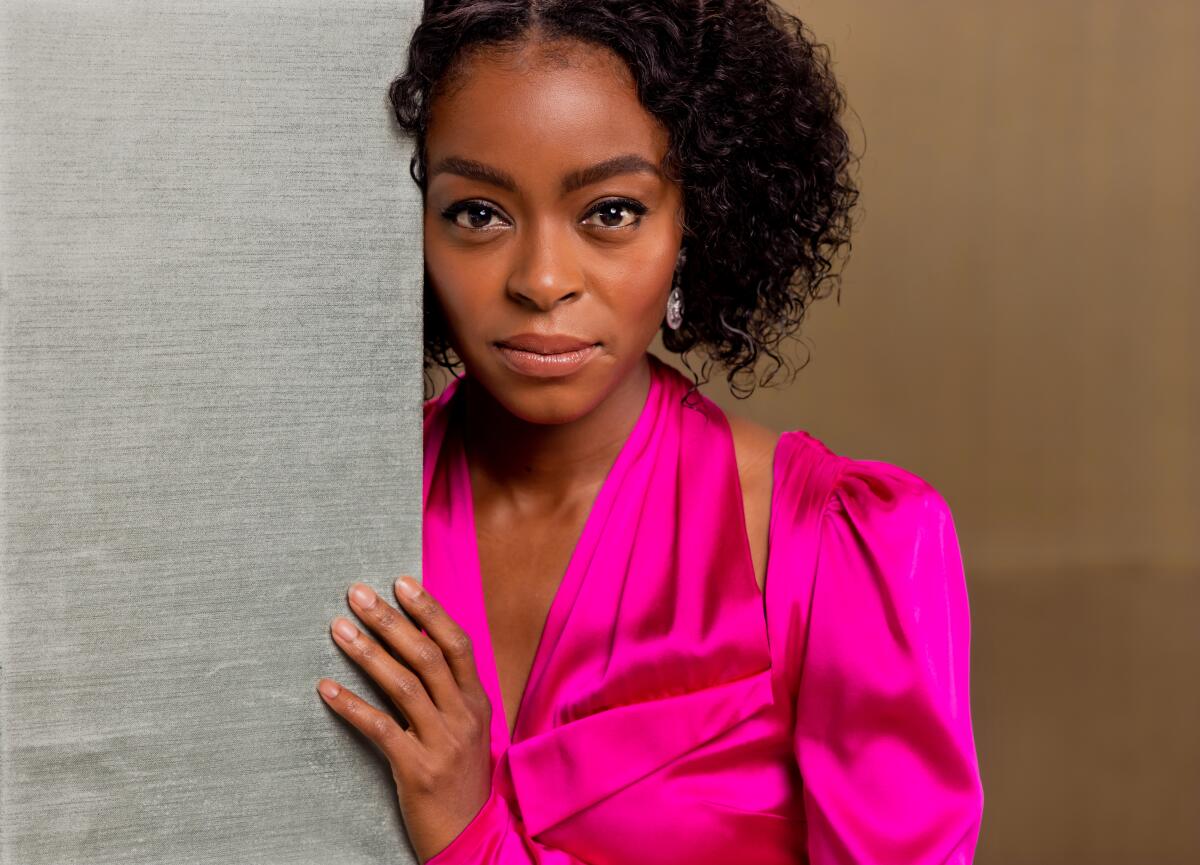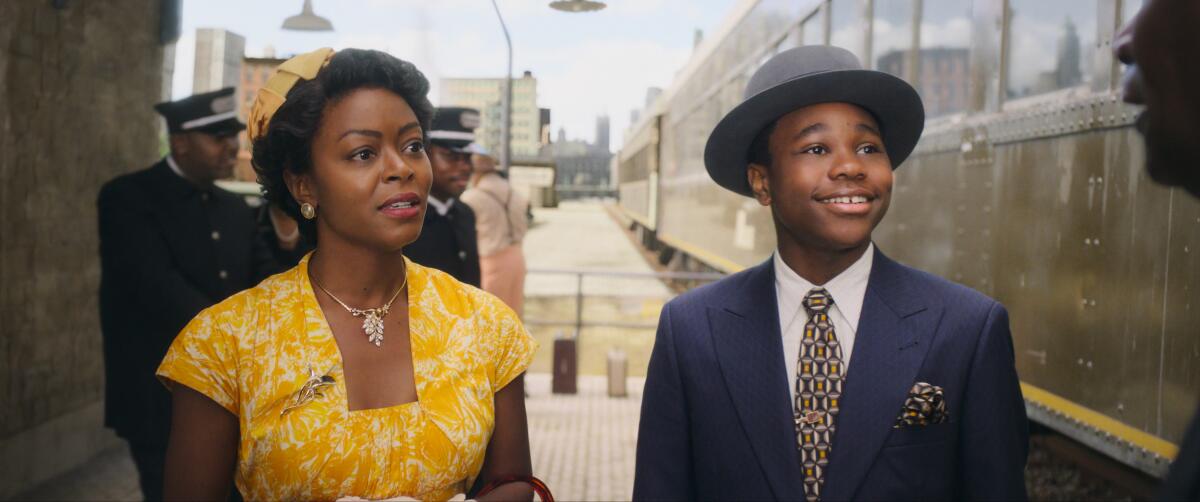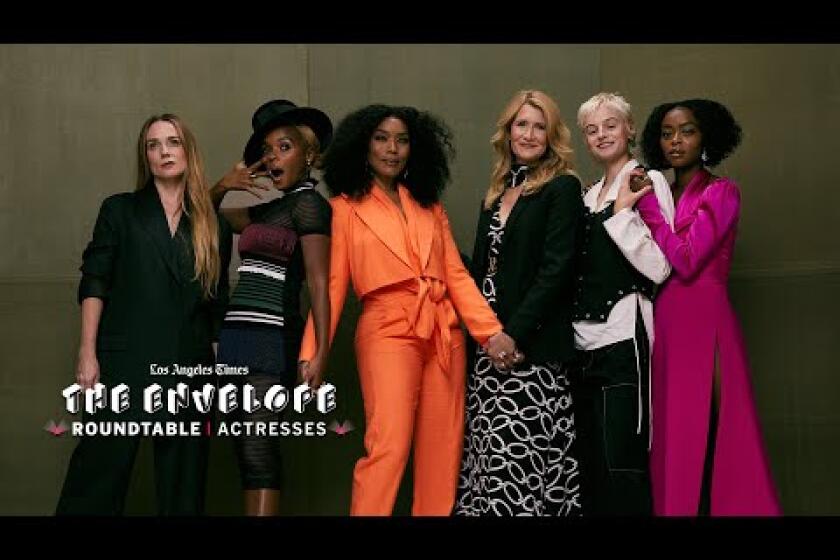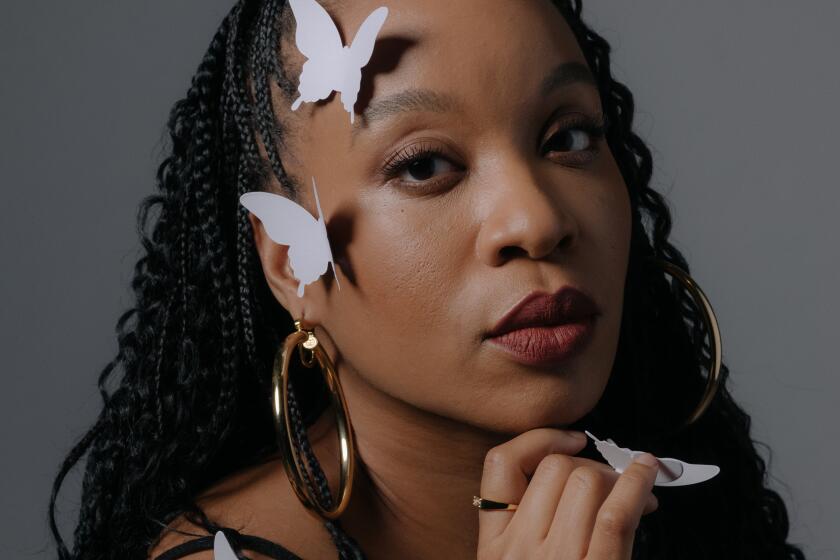Danielle Deadwyler on ‘Till’: There are qualities of humanity that surpass the grief of loss

- Share via
Back in the summer of 2021, Danielle Deadwyler’s reps asked her if she’d be interested in trying out for the starring role in “Till.” She didn’t say yes, but she also didn’t say no. Deadwyler at the time was playing the sister of a woman who suffers a soul-crushing loss in Netflix’s “From Scratch.” “I knew I had to give me a minute,” she says. Taking a week, she got through the script. Written by Michael Reilly, Keith Beauchamp and Chinonye Chukwu, with Chukwu also directing, “Till” centers on the circa 1955 horrific murder of 14-year-old Emmett Till by white supremacists, told from the perspective of his mother, Mamie. Not every actor would want to go from one emotionally draining project to another. Deadwyler, though, was all in, earning a SAG Award nomination for the effort.
“I trust the work of Chinonye,” she says. “I trust the heart of her. That was a big draw for me. Not to mention paying deep honor, respect and reverence to Mamie and Emmett’s history.”
Bassett, Monáe, Emma Corrin, Kerry Condon, Danielle Deadwyler and Laura Dern open up about the benefits of intimacy coordinators and channeling pain.
There were many pre-production conversations between you and Chinonye Chukwu. Talk about how you both approached telling the story from Mamie’s point of view.
Our initial conversation was about what it means to be the mourning, wailing Black mother. What that looks like cinematically, in society, in media. How do we confront that? Black motherhood is much richer and more complex than has been presented. We talked about the complexity of Mamie Till’s life, about the public and private nature of who she is and of her labor. We wanted to humanize her, show she had a full life. She wasn’t just this iconic image. [Chinonye and I] shared information with each other from books on the Black resistance and the American South — to music, archival images and footage. Everything. And we talked about all of it often because we needed to be on the same page. And we hit every single beat in the script. Then once we started to film, we both let all of it go.

Part of the success of “Till” was how easy it was to accept you and co-star Jalyn Hall as mother and son. How did you make that happen in just a few scenes?
Jalyn’s mother is really his best friend. I just marvel at that. When you have her present, Jalyn can be himself. We’re all from Atlanta. There was a kinship we found. From the jump on the first chemistry read on Zoom, Jalyn was being his full self. When we were signing off, he said, “Miss Danielle, I just want to say, you have a beautiful smile,” and I said “Excuse me?” But he was just being his charismatic, beautiful, brilliant self. You can only do that if you have a beautiful, wonderful mother who supports that kind of fullness and freedom. That’s parallel to Emmett.
Chinonye has said that your ability to show in close-ups so many emotions — grief, rising anger, steeliness — changed how she planned to shoot certain scenes. Did she talk to you about this?
I don’t look at footage or playback. I have to be deeply entrenched in the work. Looking at it is antithetical to having that experience. I know that Chinonye has talked about the courtroom scene, that she shifted it after we began shooting my footage. She had the visual language already and upon seeing the first take she made technical shifts with [cinematographer] Bobby Bukowski to show the world and everyone in it and still stay within Mamie’s POV, and we got to go home earlier than we thought.
That’s the brilliance of Chinonye to be able to do that. To get all of the resources, to synthesize all of the information, then to throw it away and allow intuition and spirit to craft something deeply artful.
Director Chinonye Chukwu sees her film as about politics even though it focuses first on humanity and feeling.
You’ve said there’s a joy in talking about Emmett. Explain.
People don’t know who and how he was. All that’s known is that a Black child was lost to terrorism, lynching. But he was more. He was a jokester. He had a brilliant relationship with his mother. He cooked. She was reliant on him. And she was prescient enough to support him in the growth that he wanted. People don’t talk about those things. We have a moment where we talk only about the loss of the person, about Black people who are lost to these kinds of tragedies, who get halted. The image is like their bodies are snatched. But they aren’t that. He was this growing, lovely child. He loved comedy and playing and he was spiritual. I like people to know that, and it’s a joy to share.
In the end, what did you learn about what it takes to film two tragedy-driven stories in a row?
To have those projects back to back required hyper-focus. But I’m interested in these women, these real folks. These are stories that aren’t just traumatic. We lean into that because we have an American obsession with spectacle. But both projects show that in those singular moments of loss are also resounding qualities of joy, of reclamation of one’s internal pride and refashioning of oneself. I find those things deeply instructive. I’m always trying to learn how to be a better me through this kind of work.
More to Read
Sign up for The Envelope
Get exclusive awards season news, in-depth interviews and columnist Glenn Whipp’s must-read analysis straight to your inbox.
You may occasionally receive promotional content from the Los Angeles Times.












